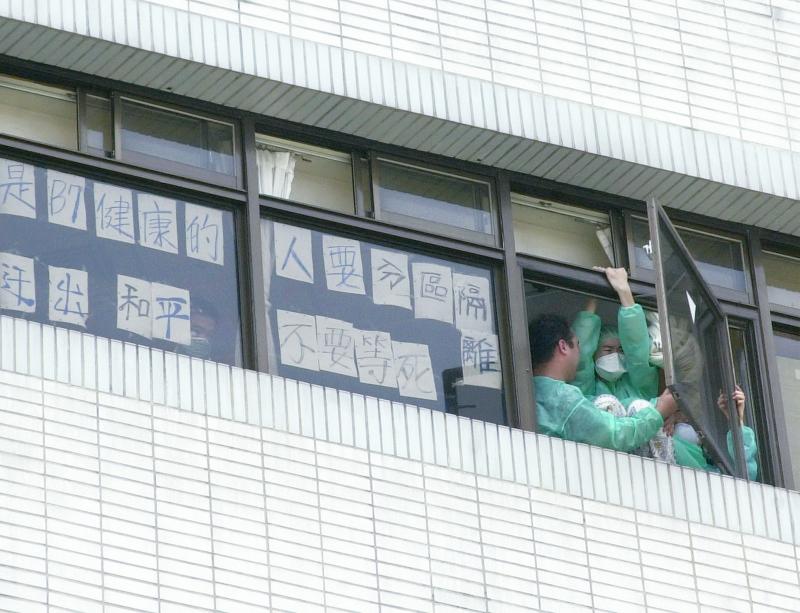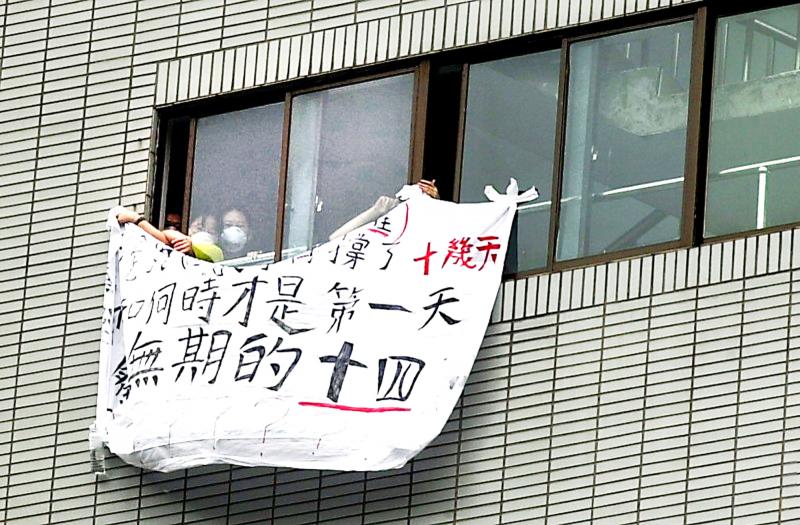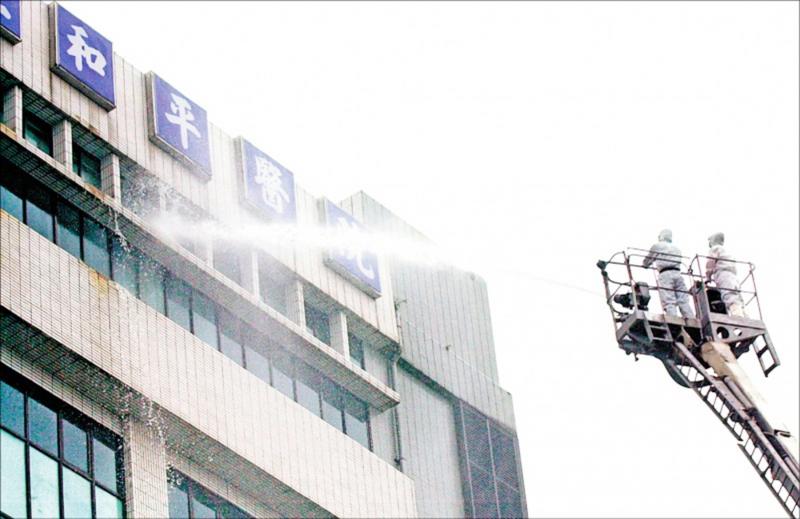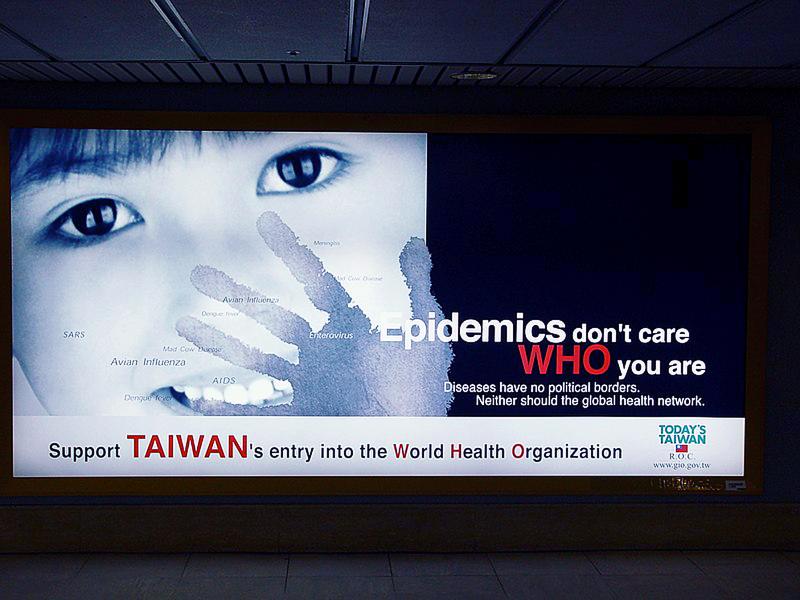April 20 to April 26
The windows of Hoping Hospital were plastered with white banners as staff members clashed with the police as they were trying to escape. One nurse even tried to jump out the eighth floor window before being stopped by colleagues.
“We are healthy people, we want separation from SARS patients. We want to get out of Hoping Hospital and we don’t want to wait for death,” one sign read.

Photo: Wang Ching-wei and Chu Pei-hsiung, Taipei Times
Several days earlier on April 24, 2003, the Taipei City Government’s newly established SARS Emergency Response Task Force ordered the hospital to lock down and for its over 1,000 staff and patients to return to the facility to undergo collective quarantine for two weeks.
The move came after seven hospital staff came down with possible SARS symptoms on April 22. Up to that point, Taiwan had only seen 28 cases since the virus was first confirmed on March 14 and proudly announced its “three zeros” just a few days earlier: zero deaths, zero cluster infections and zero exported cases.
The number of suspected cases stemming from the hospital grew to 26 by the day of the shutdown. Panic ensued, especially due to the abruptness of the decision. Unprepared to deal with the situation, conditions in the hospital quickly worsened.

Photo: Wang Ching-wei and Chu Pei-hsiung, Taipei Times
Out of the 8,096 confirmed cases in 29 countries during the outbreak, 346 of them took place in Taiwan — with 150 reportedly occuring in Hoping Hospital. Reports of the hospital death toll vary between 24 and 35.
The nation’s bout with SARS is an often-mentioned factor in Taiwan’s success in containing the COVID-19 pandemic.
“Those of us who lived through the painful experience of SARS took the lessons to heart,” write Shin Kong Wu Ho-Su Memorial Hospital doctors Chang Tsang-neng (張藏能) and Hou Sheng-mao (侯勝茂) in the introduction to their article, “COVID-19 and the SARS experience.”

Photo: Wang Min-wei, Taipei Times
PANIC AT THE HOSPITAL
The SARS virus was first confirmed in Taiwan on March 14, imported by a businessman returning from China. It spread slowly at first, with 23 cases of infection reported over the next month.
The first case at Hoping Hospital was a laundry worker who began feeling unwell on April 12. Despite multiple tests, she was not diagnosed with SARS and remained on duty, living at the hospital and socializing with others. She was only put in an isolation room when her condition worsened on April 18, and tested positive on April 22.

Photo courtesy of Wikimedia Commons
The chaos in the hospital was recorded in hospital pediatrician Lin Ping-hung’s (林秉鴻) diary, which was serialized in the Liberty Times (Taipei Times’ sister newspaper). He writes that there were few directions on how exactly to carry out the quarantine, and the hospital was pretty much “under anarchy” in the first few days.
“Besides reinforcing public perception that ‘SARS spread from Hoping Hospital’ to punish us, I don’t see how this kind of quarantine adheres to virus prevention procedures. Why didn’t we just have uninfected staff members quarantine at home? If we were going to quarantine collectively, why didn’t they properly separate us?”
On April 27, Yeh Chin-chuan (葉金川), the health minister at the time, entered the hospital and remained there to ensure proper measures, keep order and boost morale. In addition to the unrest in the hospital, four staff members failed to return. Two checked themselves in after the police threatened to arrest them, and a warrant was issued on April 30 for the remaining two.
The B8 ward, where the laundry worker was being treated, was the hardest hit. A nurse says in the documentary Hoping Hospital (和平醫院) that at one point half of the 16 nurses on duty were infected, and by the time they were allowed to leave, there were only two nurses taking care of 16 SARS patients. The first nurse and doctor in Taiwan to die from SARS both worked at that ward.
Over the next week, staff and hospital workers were gradually moved out to other quarantine locations, with the last group departing on May 8.
By May 24, the situation had abated to the point that Lee Ming-liang (李明亮), head of the SARS-prevention command center, announced that people could resume their normal lives, although he stressed that the nation must remain alert. The WHO removed Taiwan from its list of infected areas on July 5.
WHO CARES?
Just like the current situation, Taiwan also had its issues with the WHO back then. Researchers complained of being shut off from samples and vital information because Taiwan wasn’t a member, instead being told to go through China. Much of Taiwan’s information was received via third party, significantly bogging down the process.
According to CNN, it took the WHO seven weeks after Taiwan’s first SARS infection and after the Hoping Hospital lockdown to send experts to the nation. Taiwanese experts were also invited to attend a July SARS conference in Kuala Lumpur. To show who was in charge, however, China announced its “approval” of both decisions — although Taiwan’s government stressed that China played no role in the events.
Then-foreign minister Eugene Chien (簡又新) wrote in an op-ed for the New York Times that “[m]ember states should stop allowing political expedience to dictate WHO policy. Taiwan needs the WHO just as much as the WHO needs us in fighting SARS and future epidemics.”
On May 29, then-US president George W. Bush signed a bill pledging to support Taiwan’s bid for WHA observer status. Japan and Canada, as well as most of Taiwan’s allies, also announced their support. China was not happy.
“Taiwan, a Chinese province, does not have qualifications to join WHO under any terms,” Chinese Foreign Ministry spokeswoman Zhang Qiyue (章啟月) warned.
The bid failed. Taiwan would only get its wish in 2009 under the designation “Chinese Taipei” following the improvement of relations with China under Chinese Nationalist Party (KMT) rule. The invitation was rescinded in 2017 when the KMT lost power.
Taiwan in Time, a column about Taiwan’s history that is published every Sunday, spotlights important or interesting events around the nation that have anniversaries this week.

Jacques Poissant’s suffering stopped the day he asked his daughter if it would be “cowardly to ask to be helped to die.” The retired Canadian insurance adviser was 93, and “was wasting away” after a long battle with prostate cancer. “He no longer had any zest for life,” Josee Poissant said. Last year her mother made the same choice at 96 when she realized she would not be getting out of hospital. She died surrounded by her children and their partners listening to the music she loved. “She was at peace. She sang until she went to sleep.” Josee Poissant remembers it as a beautiful

For many centuries from the medieval to the early modern era, the island port of Hirado on the northwestern tip of Kyushu in Japan was the epicenter of piracy in East Asia. From bases in Hirado the notorious wokou (倭寇) terrorized Korea and China. They raided coastal towns, carrying off people into slavery and looting everything from grain to porcelain to bells in Buddhist temples. Kyushu itself operated a thriving trade with China in sulfur, a necessary ingredient of the gunpowder that powered militaries from Europe to Japan. Over time Hirado developed into a full service stop for pirates. Booty could

Before the last section of the round-the-island railway was electrified, one old blue train still chugged back and forth between Pingtung County’s Fangliao (枋寮) and Taitung (台東) stations once a day. It was so slow, was so hot (it had no air conditioning) and covered such a short distance, that the low fare still failed to attract many riders. This relic of the past was finally retired when the South Link Line was fully electrified on Dec. 23, 2020. A wave of nostalgia surrounded the termination of the Ordinary Train service, as these train carriages had been in use for decades

Lori Sepich smoked for years and sometimes skipped taking her blood pressure medicine. But she never thought she’d have a heart attack. The possibility “just wasn’t registering with me,” said the 64-year-old from Memphis, Tennessee, who suffered two of them 13 years apart. She’s far from alone. More than 60 million women in the US live with cardiovascular disease, which includes heart disease as well as stroke, heart failure and atrial fibrillation. And despite the myth that heart attacks mostly strike men, women are vulnerable too. Overall in the US, 1 in 5 women dies of cardiovascular disease each year, 37,000 of them